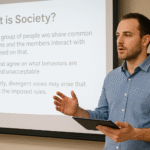Let’s recap the content of modules 3 and 4 and I’ll add some insights that I found interesting about the content of these weeks.
- Normative ethics
There are several theories that attempt to explain ethics, which is the study of what is considered right or wrong. This Wikipedia article explains some theories:
– Virtue Ethics: This theory focuses on the character of the person who is performing the action. The person must strive to have good virtues such as honesty, kindness and courage. This theory was developed in Aristotle’s time and revived to a certain extent by Saint Thomas Aquinas.
– Deontological Ethics: This theory says that there are rules and principles that govern our actions. We must act according to these rules. Some thinkers in this school of thought include Immanuel Kant, John Rawls, John Locke and Robert Nozick.
– Consequentialism: This theory focuses on the issue of the consequences of a person’s actions. It argues that we must choose actions that have the best overall result.
There are other theories such as ethics of care, pragmatic ethics and role ethics.
Morality as binding force: This is related to our social contract, shaping our interaction and behavior. Sharing values for social cohesion.
Motivating morality: morality helps us guide our actions.
- Haidt – Article on Social Intuitionist Approach to Moral Judgment – Psychological Review (2001)
Just review, content of this topic is commented on forum 1.
- Moral Foundations and Moral Foundations Theory (Tied to Haidt’s Social Intuitionism Arguments)
The text talks about the Moral Foundations Theory (MFT) of Jonathan Haidt and Jesse Graham, who propose that morality is composed of psychological bases: care, fairness, loyalty, authority, purity, equality, proportionality. Graham et al. (2013) believe that the following categories are good candidates to enter this base: liberty, honor and ownership.
Video 1: Morality is subjective and shaped by culture and psychological evolution. MFT identifies six categories: care, fairness, loyalty, authority, sanctity (synonymous with purity), and liberty. [Equality and Proportionality was added to MFT in 2023]. Each human community has defined the concepts of what it considers right or wrong, but MFT suggests that there are innate psychological conditions regarding the issue of morality. The role of moral emotion is to shape societies in their survival advantages. Humans have mechanisms for altruism, fairness, and cooperation between groups, but one challenge is the “free riders” who challenge this system of cooperation between people, so the sense of justice, rights, and fairness was created. In the sense of freedom, to avoid oppression, human peoples developed weapons.
Video 2: Jonathan Haidt talks about American politics, showing how moral psychology shapes our perceptions. He shows the difference between liberals and conservatives regarding issues such as care, loyalty, and fairness. The video shows the challenges in this time of political polarization. The interview is 12 years old, but in a way, the topic is still current. He says that human nature is hypocritical, we prioritize reputation over reality. We make self-presentations to align with the group we belong to. After talking about the difference between liberals and conservatives, he talks about economics. He says that capitalism needs careful management and regulation to maximize its potential as a system, since externalities and the creation of monopolies can harm its efficiency. We underestimate how our actions and beliefs are influenced by society, leading to a lack of awareness of our biases. This hypocritical behavior becomes evident when we try to justify unethical behavior, while we believe we are being honest. American politics is characterized by a tension between individualism and collective group dynamics. This situation creates a duality, where individuals seek personal responsibility while simultaneously relying on group solidarity. One of the questions to consider is the definition of what is the role of government in society.
- Haidt on The Moral Emotions – from the Handbook of Affective Sciences
The author shows how moral emotions help people to act in a good or bad way. Traditionally, morality is guided by reasoning and intellect. But in recent times, there are studies that try to find a guide to morality in emotions. Haidt says that emotions such as anger, shame, guilt, empathy, and disgust have a great impact on what we think is right or wrong. Unlike regular emotions, moral emotions are linked to judgments of good and bad.
Moral emotions act through elicitors: which are events that test this motion. An example is when we feel empathy when we see a person suffering. And Action Tendencies: are actions motivated by feelings. An example is when we fight with a friend, we feel guilty and go to the person to apologize and try to rekindle the friendship.
Some positive emotions are gratitude and elevation. These make us feel good. When we see someone having a noble attitude, it inspires us to do good.
Some negative emotions are anger, disgust and shame. This gives a feeling of punishing those who are doing something considered wrong or avoiding the situation.
The role of culture: emotional responses will depend on the culture, as each culture calibrates these emotions differently. Morel emotions are not universal; each society may emphasize one aspect more than others.
- Moral Philosophy Blog
Moral Philosophy focuses on studying ethical theories. The blog gives examples of theories: metaethics, normative ethics, and applied ethics.
Metaethics: It tries to understand the nature of goodness and badness. Moral realists say that there are good and bad things in the world independent of us, human beings. Antirealists say that the judgment of good and bad is defined by us, human beings. We invented morality. For cognitivists, moral statements describe the world. For non-cognitivists, moral statements are linked to the expression of feelings or telling people what to do.
The subject of Normative Ethics was covered in topic 1, but in short, they are general ethical theories of how we should live, the main theories are in topic 1.
Applied ethics is the most practical area, saying what is right or wrong. It covers topics such as animal rights, buttoning, punishments, etc.
- BADM 605 – 3.1 – On the Philosophical Approach to Normative Ethics
The material goes into more detail about consequentialism, deontological and virtue ethics. It says that sociopaths and psychopaths lack morals. And Moral Relativism says that the environment may call for different ethical standards and actions. In consequentialism we can highlight utilitarianism which argues that right action can maximize individual or collective welfare. One criticism of this current is that “the ends justify the means.”
- BADM 605 – 5.2 – On Business Ethics and Ethical Lapses in Business
The material discusses ethical failures in the corporate world. Business Decision-Making: the company must find the best balance between sectors to obtain the best benefit at the lowest cost. In capitalism, for the system to run, it is important to defend private property rights and free markets. Businesses have 4 stakeholders as their responsibility: customers, employees, society and Creditors & Owners. Some cases of fraud in Business are shown, such as Bernie Madoff, Ivan Boesky and Jérôme Kerviel.
- BADM 605 – 5.3 – Haidt’s Social Intuitionist Approach to Ethics.
The document shows the moral bases of topic 3, showing in more detail how this affects everyday life. It shows the chameleon effect, in which we unconsciously copy people around us. And at the end, it shows the system of trust in society, showing rates of corruption and bribery.
- Ariely: TED talk about our moral code
Ariely shows how our moral intuition can be flawed. Cheating is relatively common, and people will cheat to a certain degree, even to a certain degree of dishonesty, to maintain their positive self-image. When a person observes another person cheating, this influences their tendencies to cheat. The environment influences individual behavior.
- Ariely: TED talk about our moral code
Ariely says that it gives people the motivation to work. If they could, most people wouldn’t work. They would be at the beach enjoying life, but to do that, they need money, and to have money, they need to work. But beyond money, work involves the issue of personal fulfillment and progress. He gives the example of someone who climbs a mountain, the path is painful, suffering and uncomfortable, but many people who do this want to do it again, because they feel good about achieving their goals. He spoke of a company project that was canceled by the CEO and the team on that project felt unmotivated (even though they were earning their salary for that time).
- Get Rich Cheating Advertisement
Funny video to talk about companies and businesses that became rich dishonestly.
- The honest truth about dishonesty
Chapter 1: The author introduces the concept of Simple Model of Rational Crime (SMORC). People cheat based on a cost-benefit analysis of three factors: the potential gain from cheating, the likelihood of getting caught, and the punishment if caught. An experiment on solving math problems, in which people were paid based on the number of correct answers, where the answers could be checked, and the person would self-evaluate, showed a tendency to cheat somewhat. Surprisingly, even by increasing the reward or reducing the vigilance of being caught, the cheating rate did not change much. Unlike SMORC, other factors were also taken into account, such as self-image.
Chapter 2: The author introduces the idea of the “fudge factor”: people can cheat a little and still feel honest. This is based on the rationalization of behavior. In one study, people were paid directly in cash for the results of a math test, while others were paid in tokens that would be converted into cash. Those who were paid in tokens cheated twice as much. Because people do not have the money directly, they feel less guilty. Another situation is when someone takes office supplies from the company for personal use, because they do not see the money directly and do not see the financial loss to the company.
Chapter 3: Conflicts of interest and personal biases influence our decisions, often subconsciously. We may act unethically if we believe something is fair. The author gives the example of doctors and financial advisors who may make decisions that benefit themselves more than their patients and clients. Being aware of our biases is difficult, and being aware of conflicts of interest does not prevent unethical behavior.
Chapter 4: Physical and mental exhaustion affects our ability to make ethical decisions. He coined the term “self-control depletion,” as exhaustion makes people less resistant to cheating.
Chapter 5: In this chapter, it is shown that when people know they are using a counterfeit product or believe they are using one, this influences their behavior, people tend to cheat more. In addition, it is said that when someone commits small acts of dishonesty, it can lead to more dishonest behavior.
Contribution Points Considering the learning from this week’s reading and materials. I would like to share some insights:
1. Virtue Ethics reminds me of people who challenged the status quo and secured rights and achievements, such as Martin Luther King.
Deontological is more closely linked to the issue of following laws, the constitution, and rules imposed for some reason.
Consequentialism: This is more closely linked to Ariely’s work, in terms of evaluating the cost-benefit of following a rule.
3. Morality is very much based on culture. Culture can be very much linked to the issue of survival in an environment. An example of this is this BBC report, which shows that there are several societies that have learned to cook something through a preparation ritual, but deep down, this form of preparation exists so that it is possible to eat a food without being poisoned.
BBC report: How do people learn to cook a poisonous plant safely? https://www.bbc.com/news/business-48859333
One issue to think about is the issue of “free riders.” In more honest societies that have a more consolidated social welfare system, coexistence seems to be more fluid because there is a system of trust. When a society is falling apart, trust becomes more difficult. An example of this is when supermarkets have to lock items so they are not stolen, while there are places where customers can self-check their purchases.
5. I agree more with the Antirealists. Morality is related to consciousness. Beings that have a more advanced conscious process can define the concept of “good” and “bad.” Animals normally act on instinct, as if they were pre-programmed to do something.
6. A very important issue is this issue of psychopaths and sociopaths. Why do they exist? Is it a mistake of nature? How can we deal with this situation? If they commit (serious) crimes and are caught, is the best way for society to deal with them a death sentence? Like the case of Wade Wilson. https://www.youtube.com/watch?v=-yGY5_yZRCk
7 and 11. Was dishonesty one of the main causes of the 2008 financial crisis? Because the banks knew they were doing something unsustainable, but since there were a lot of people making money, they let the game go on. Many banks and financial companies were rated AAA, what happens to the trust of companies that make this rating after what happened?
Are we relativizing morality in modern times? Because we have criminals becoming celebrities (https://www.bbc.com/news/articles/cvgd2y5e23jo) and scammers teaching persuasion (Jordan Belfort, who inspired the film The Wolf of Walstreet).
Study for contribution to the subject on morality: Dunleavy et al. (2010) shows that “employees have a more positive perception of coworkers who are honest than of coworkers who cheat. Thus, in an organizational setting, honesty is associated with workers who possess knowledge, intelligence, and skill.” Ariely shows that as human beings, we have certain tendencies to cheat, that cheating can lead to greater cheating, but we have to do our best to be honest, as this generates a more harmonious social and work environment.
References
- · Amazon. (n.d.). Way of the Wolf: Jordan Belfort. Retrieved September 20, 2024, from https://www.amazon.com/Way-of-Wolf-Jordan-Belfort-audiobook/dp/B0725R3G3Q
- · BBC News. (2019, July 4). Why are so many goods locked away in US stores? BBC News. https://www.bbc.com/news/business-48859333
- · BBC News. (2023, September 11). Florida death row killer Wade Wilson fights to stay alive in latest court ruling. https://www.bbc.com/news/articles/cvgd2y5e23jo
- · Cole, D. (2022, July 30). Why drugstores are locking up goods, and what it says about the economy. CNN Business. https://www.cnn.com/2022/07/30/business/drug-stores-locked-products/index.html
- Dunleavy, K. N., Chory, R. M., & Goodboy, A. K. (2010). Responses to deception in the workplace: Perceptions of credibility, power, and trustworthiness. Communication studies, 61(2), 239-255.
- · Ferrise, A. (2023, February 28). Retailers try to curb theft: Locking away goods and angering customers. PennLive. https://www.pennlive.com/business/2023/02/retailers-try-to-curb-theft-locking-away-goods-and-angering-customers.html
- · Newsweek. (2023, September 19). Florida death row killer Wade Wilson fights to stay alive in court. https://www.newsweek.com/wade-wilson-florida-killer-death-row-court-update-1956581
- · Yahoo Finance. (2023, September 20). Jordan Belfort: May be a financial legend, but what’s the truth? https://finance.yahoo.com/news/jordan-belfort-may-financial-legend-103300688.html
- · YouTube. (2019). Why drugstores are locking up products [Video]. https://www.youtube.com/watch?v=-yGY5_yZRCk
Week 3 Topic: Society, Social Norms, and Ethics:
• Different approaches to prescriptive and descriptive ethics. • Moral philosophy vs. moral psychology. • The social intuitionist approach to ethics. • Consequentialism and utilitarianism. • Deontology and rules or principles-based ethics. • Virtue ethics. • Ethics in personal relations, market arrangements, institutions, organizations, the economy, the legal system, and society.
Key Readings & Course Material:
- Haidt’s Article on the “Social Intuitionist Approach to Moral Judgment” Psychological Review 2001;
- Haidt on “The Moral Emotions” from the Handbook of Affective Sciences.
- Ariely’s Honest Truth, Introduction.
- Wikipedia Article on Normative Ethics (https://en.wikipedia.org/wiki/Normative_ethics )Links to an external site.
Additional Suggested Material:
- Moral Foundations Theory (https://moralfoundations.org/Links to an external site. )
- Moral Philosophy Information Blog (https://moralphilosophy.info/Links to an external site. )
- Overview of Normative Ethics from Philosophical Papers (https://philpapers.org/browse/normative-ethicsLinks to an external site. )
Week 4 – Ariely’s Honest Truth About Dishonesty – Introduction and Chapters 1-5:
Ariely’s Honest Truth About Dishonesty – Introduction and Chapters 1-5:
• The simple model of rational crime (SMORC). • Ariely on fun with the fudge factor; honesty & cheating in golf. • Conflicts of Interest: Blinded by Our Own Motivations. • Ego Depletion: Why We Blow it when We are Tired. • Social Signals: Wearing Fakes, Self-Image, and Cheating.
Key Readings & Course Material
1. Ariely’s Honest Truth, Introduction and Chapters 1-5
Additional Suggested Material:
1. Ariely: TED talk about our moral code: https://www.youtube.com/watch?v=onLPDegxXx8Links to an external site.
2. Ariely on the meaning of work: https://bigthink.com/videos/meaningful-work/Links to an external site.
3. Get Rich Cheating Advertisement: https://www.youtube.com/watch?v=6jnZvTLMc8YLinks to an external site.


